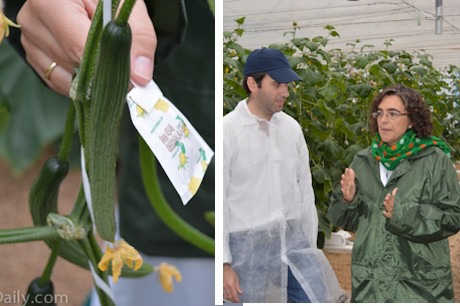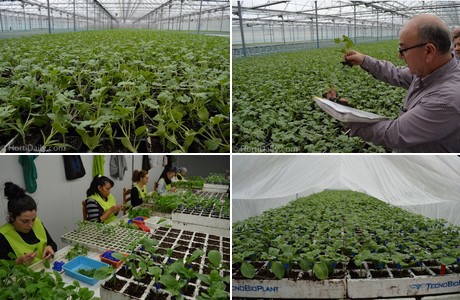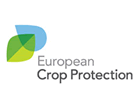
Presentation about current situation in Almeria regarding crop protection.
EFSA Regulations
After the residue crisis in 2006, the EFSA set regulations for maximum residue levels (MRLs) in the fresh produce industry. The greenhouse growers in the EU needed to decrease the residue levels to a certain fixed level by 2014. When being under this level, the products are considered as safe for the human health. Currently, 97.5% of the greenhouse growers in Europe grow vegetables with a lower pesticide level than the allowed MRL. A great achievement, but according to ECPA, there can be achieved even more.Residue Management Project
"The residue levels in Almeria's fresh produce are able to decrease more by using more IPM", says Monika Roth, who leads the Residue Management Project. ECPA started this project in 2013. It aims at supporting the reduction of residues through the promotion of ÌPM principles and good agricultural practices.In order to stay below this MRL, growers need to comply with the Good Agricultural Practice (GAP) which has as basic principle to use pesticides as little as possible and only when necessary. In line with GAP, the growers are applying an Integrated Pest Management (IPM) strategy. This means that growers carefully consider what crop protection product they will use for what specific pest or disease instead of using only one product. Additionally, monitoring is very important and, therefore, measures can be pro actively taken instead of reactively.
In order to support the Spanish farmers, ECPA partnered with the Spanish research center Las Palmerillas to develop a programme to share best-practices. This project has developed a ‘train-the trainer’ program with a manual of best practices particularly for on greenhouse-grown peppers and tomatoes.

Experimental Station 'Las Palmerillas' uses Amblyseius swirskii as predator for white fly.
Pests in Almeria
In Almeria, the growers mainly suffer from pests like thrips, whiteflies, aphids and diseases like botrytis. Due to the introduction of beneficial insects in the greenhouses, it is possible to beat the pests. Besides, sticky traps are used to monitor the existence of pests in the greenhouse. Botrytis is minimized by an insulated roof system to decrease humidity. Secondary pests or diseases are controlled by specific treatments that will not harm the beneficial insects. Besides controlling pests in greenhouse, seeds can already be treated with crop protection products to improve resistance for certain diseases when they are adult plants.
Visit to Tecnobioplant Nursery. Also grafting of young plants on resistant rootstocks is playing a major role in decreasing crop problems.
Restrictions Supermarkets
An additional reason why the project is beneficial for growers is the fact that they have to comply with the regulations of the supermarkets. Even though the MRLs are set by the European Commission, some growers cannot sell their products to the supermarkets when acting to these regulations. As Manuel Escánez, an Almerian greenhouse grower explained at the greenhouse visit, increasingly more supermarkets ask for lower MRLs than defined by the EC. Therefore, growers are forced to use an IPM strategy and to find innovative ways to grow crops with low residue levels.Project in Turkey
Due to the fact that the Residues Management Project shows good results in Almeria, ECPA gave their first presentation in Antalya, Turkey recently. Antalya has the same climate as Almeria which make this project especially useful. Additionally, Turkey is a country that exports a large number of fresh produce to the EU and therefore also has to comply to the same rules as the EU growers. The presentation was given to 40 advisers who will spread the information to other greenhouse farmers in the area. The first feedback from these advisers was positive.For more information

European Crop Protection Association
T: +32 2 663 15 50
Fax: +32 2 663 15 60
www.ecpa.eu
